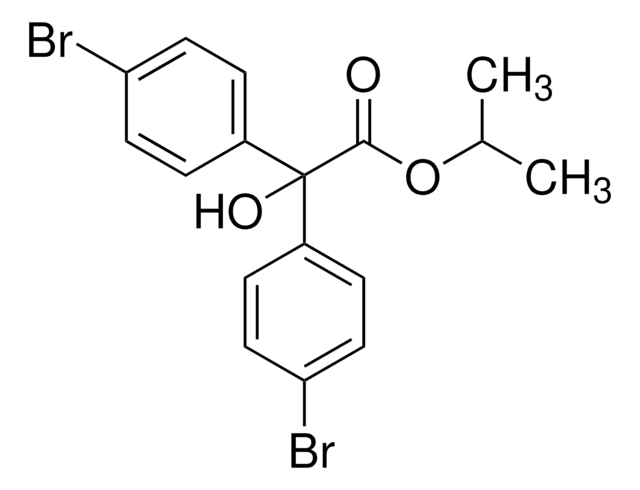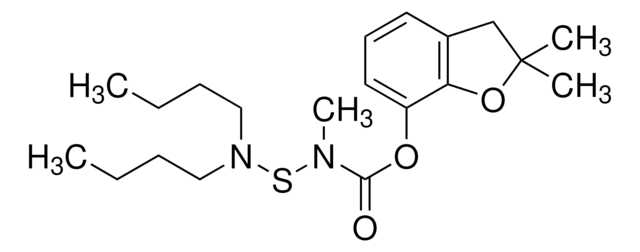93744
Bromopropylate
certified reference material, TraceCERT®, Manufactured by: Sigma-Aldrich Production GmbH, Switzerland
동의어(들):
Isopropyl 4,4′-dibromobenzilate, Phenisobromolate
로그인조직 및 계약 가격 보기
모든 사진(1)
About This Item
실험식(Hill 표기법):
C17H16Br2O3
CAS Number:
Molecular Weight:
428.12
Beilstein:
2152560
MDL number:
UNSPSC 코드:
41116107
NACRES:
NA.24
추천 제품
Grade
certified reference material
Quality Level
제품 라인
TraceCERT®
grade
TraceCERT®
유통기한
limited shelf life, expiry date on the label
제조업체/상표
Manufactured by: Sigma-Aldrich Production GmbH, Switzerland
SMILES string
CC(C)OC(=O)C(O)(c1ccc(Br)cc1)c2ccc(Br)cc2
InChI
1S/C17H16Br2O3/c1-11(2)22-16(20)17(21,12-3-7-14(18)8-4-12)13-5-9-15(19)10-6-13/h3-11,21H,1-2H3
InChI key
FOANIXZHAMJWOI-UHFFFAOYSA-N
유사한 제품을 찾으십니까? 방문 제품 비교 안내
관련 카테고리
일반 설명
This certified reference material (CRM) is produced and certified in accordance with ISO/IEC 17025 and ISO 17034. This CRM is traceable to primary material from an NMI, e.g. NIST or NMIJ.
Certified content by quantitative NMR incl. uncertainty and expiry date are given on the certificate.
Download your certificate at: http://www.sigma-aldrich.com
Bromopropylate is a nonsystemic and nonpenetrating acaricide that remains on the peel of fruits and does not migrate into the pulp. It belongs to the family of organophosphate pesticides and is used in the cultivation of lemon trees and other crops. Bromopropylate primarily acts by interfering with the respiratory system. It affects the mitochondria by inhibiting key enzymatic activities and ATP generation, which leads to the formation of reactive oxygen species, and destroys proteins, membranes, unsaturated fatty acids, DNA, etc.
Bromopropylate has to be monitored in the Multiannual Control Programme for Pesticides Residues (MACP), run within the EU and EFTA in/on products of plant origin.
The use of bromopropylate has been banned across the European Union. Maximum residue levels (MRLs) have been set according to Reg. (EU) No 310/2011 for bromopropylate for various products of plant and animal origin from 0.01 to 0.05 mg/kg.
Certified content by quantitative NMR incl. uncertainty and expiry date are given on the certificate.
Download your certificate at: http://www.sigma-aldrich.com
Bromopropylate is a nonsystemic and nonpenetrating acaricide that remains on the peel of fruits and does not migrate into the pulp. It belongs to the family of organophosphate pesticides and is used in the cultivation of lemon trees and other crops. Bromopropylate primarily acts by interfering with the respiratory system. It affects the mitochondria by inhibiting key enzymatic activities and ATP generation, which leads to the formation of reactive oxygen species, and destroys proteins, membranes, unsaturated fatty acids, DNA, etc.
Bromopropylate has to be monitored in the Multiannual Control Programme for Pesticides Residues (MACP), run within the EU and EFTA in/on products of plant origin.
The use of bromopropylate has been banned across the European Union. Maximum residue levels (MRLs) have been set according to Reg. (EU) No 310/2011 for bromopropylate for various products of plant and animal origin from 0.01 to 0.05 mg/kg.
애플리케이션
The certified reference material (CRM) is intended to be used as a calibrant for chromatography and other analytical techniques. Bromopropylate CRM may also find following uses:
- To elucidate the inhibition of plasma and brain acetylcholinesterase activity in Wistar rats with a mixture of 5 pesticides: chlorpyrifos, alphacypermetrin, bromopropylate, carbendazim, and mancozeb
- Study the degradation processes of bromopropylate, coumaphos, chlordimeform, cymiazole, flumethrin, and fluvalinate in aqueous media by HPLC
- To develop a liquid-phase microextraction method using deep eutectic solvent for extraction and preconcentration of diazinon, metalaxyl, bromopropylate, oxadiazon, and fenazaquin pesticides from samples such as grape and sour cherry juices, fresh beet, cucumber, potato, and tomato followed by gas chromatography-flame ionization detection
- To develop a multi-residue method for the determination of azinphos methyl, bromopropylate, chlorpyrifos, dimethoate, parathion methyl, and phosalone in apricots and peaches using negative chemical ionization ion trap technology
- Simultaneous determination of amitraz, bromopropylate, coumaphos, cymiazole, and fluvalinate residues in honey by solid-phase extraction and GC-MS
추천 제품
Find a digital Reference Material for this product available on our online platform ChemisTwin® for NMR. You can use this digital equivalent on ChemisTwin® for your sample identity confirmation and compound quantification (with digital external standard). An NMR spectrum of this substance can be viewed and an online comparison against your sample can be performed with a few mouseclicks. Learn more here and start your free trial.
법적 정보
TraceCERT is a registered trademark of Merck KGaA, Darmstadt, Germany
적합한 제품을 찾을 수 없으신가요?
당사의 제품 선택기 도구.을(를) 시도해 보세요.
신호어
Warning
유해 및 위험 성명서
예방조치 성명서
Hazard Classifications
Aquatic Acute 1 - Aquatic Chronic 1
Storage Class Code
11 - Combustible Solids
WGK
WGK 3
Flash Point (°F)
Not applicable
Flash Point (°C)
Not applicable
시험 성적서(COA)
제품의 로트/배치 번호를 입력하여 시험 성적서(COA)을 검색하십시오. 로트 및 배치 번호는 제품 라벨에 있는 ‘로트’ 또는 ‘배치’라는 용어 뒤에서 찾을 수 있습니다.
H Jacobsen et al.
Food and chemical toxicology : an international journal published for the British Industrial Biological Research Association, 42(8), 1269-1277 (2004-06-23)
Six dose groups of 8 male and female rats respectively received a daily dose equivalent to 0, 0.15, 0.006, 0.03, 0.15 or 0.3 mg/kg b.w./day chlorpyrifos (groups 1-6) and the last four dose groups (groups 3-6) received in addition daily
Javier Ramón-Azcón et al.
Journal of agricultural and food chemistry, 57(2), 375-384 (2008-12-31)
This paper reports for the first time the development of an immunoassay for the analysis of the miticide bromopropylate (BP). The chemical structure of the immunizing haptens was designed to maximize the recognition of the bis-bromophenyl group of BP. Thus
E Corta et al.
Talanta, 52(2), 169-180 (2008-10-31)
Degradation processes of bromopropylate, coumaphos, chlordimeform, cymiazole, flumethrin and fluvalinate in aqueous media have been studied by HPLC. Cymiazole is stable at any tested pH (1-11), while bromopropylate, flumethrin and coumaphos are unstable at basic pH and chlordimeform and fluvalinate
Konstantinos S Liapis et al.
Journal of chromatography. A, 996(1-2), 181-187 (2003-07-02)
A rapid, selective and sensitive multi-residue method for the determination of six common pesticides in stone fruit samples is described. The proposed method involves the extraction of the pesticides with the use of acetone solvent followed by liquid-liquid partition with
Javier Ramón-Azcón et al.
Journal of agricultural and food chemistry, 57(2), 375-384 (2008-12-31)
This paper reports for the first time the development of an immunoassay for the analysis of the miticide bromopropylate (BP). The chemical structure of the immunizing haptens was designed to maximize the recognition of the bis-bromophenyl group of BP. Thus
자사의 과학자팀은 생명 과학, 재료 과학, 화학 합성, 크로마토그래피, 분석 및 기타 많은 영역을 포함한 모든 과학 분야에 경험이 있습니다..
고객지원팀으로 연락바랍니다.








